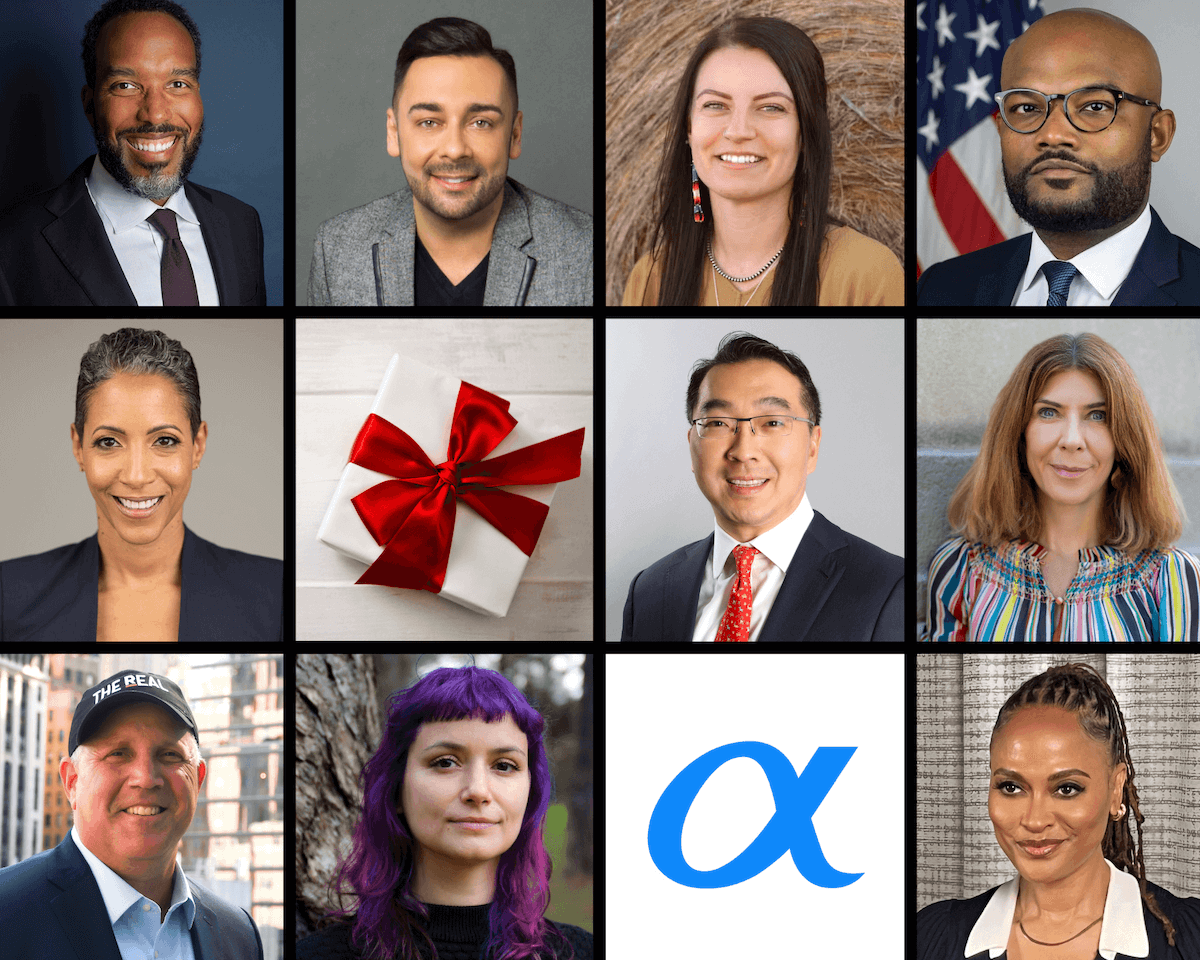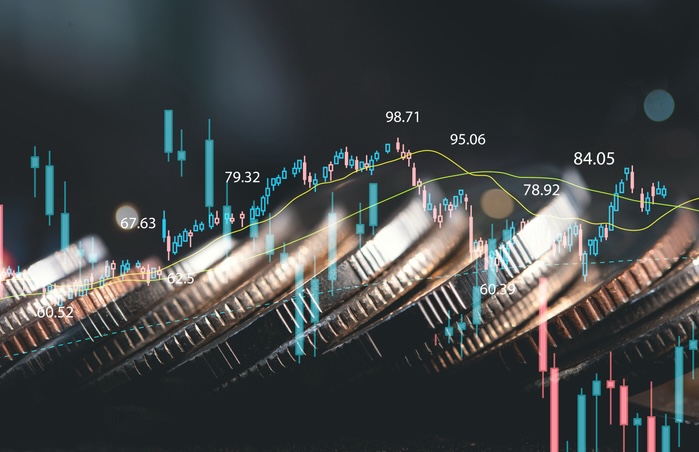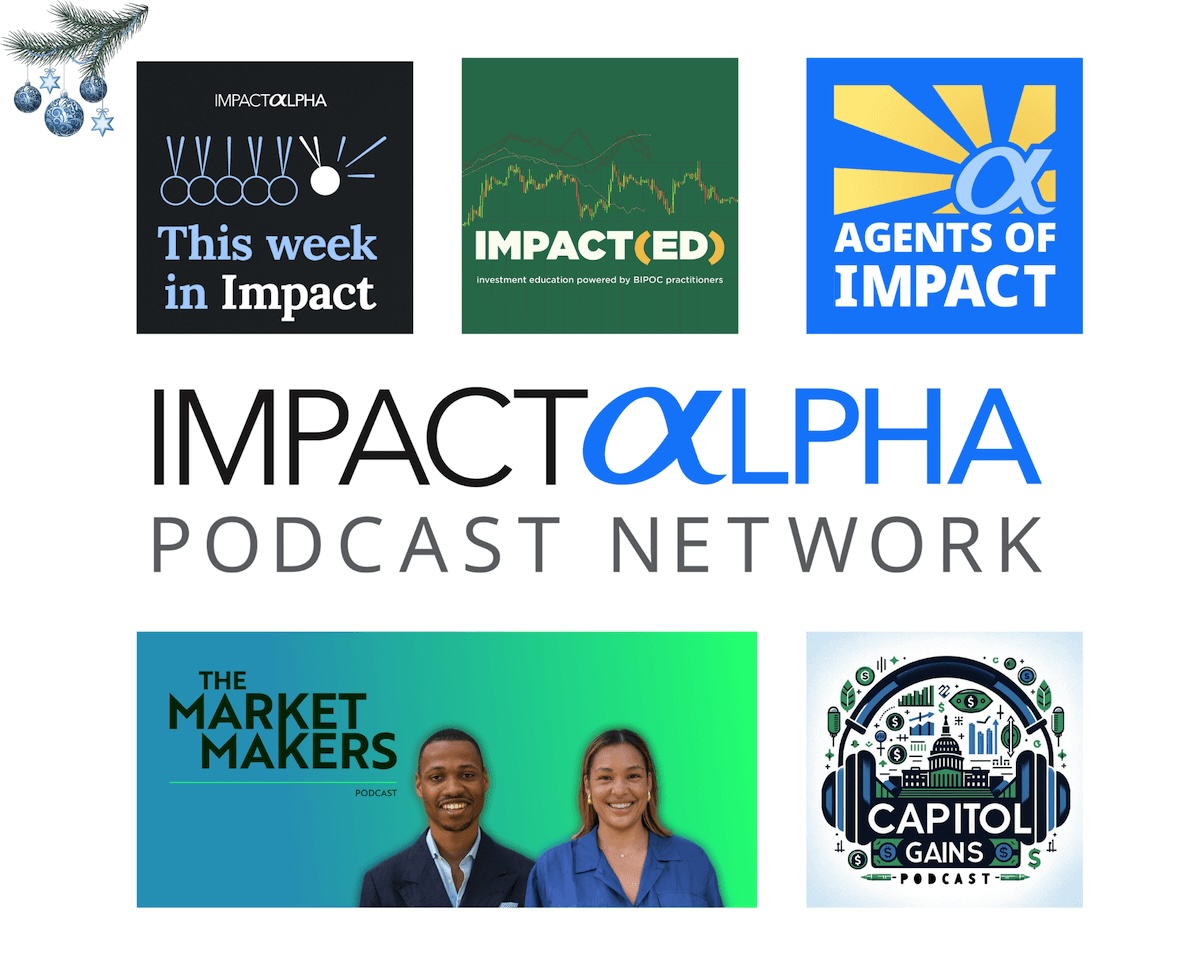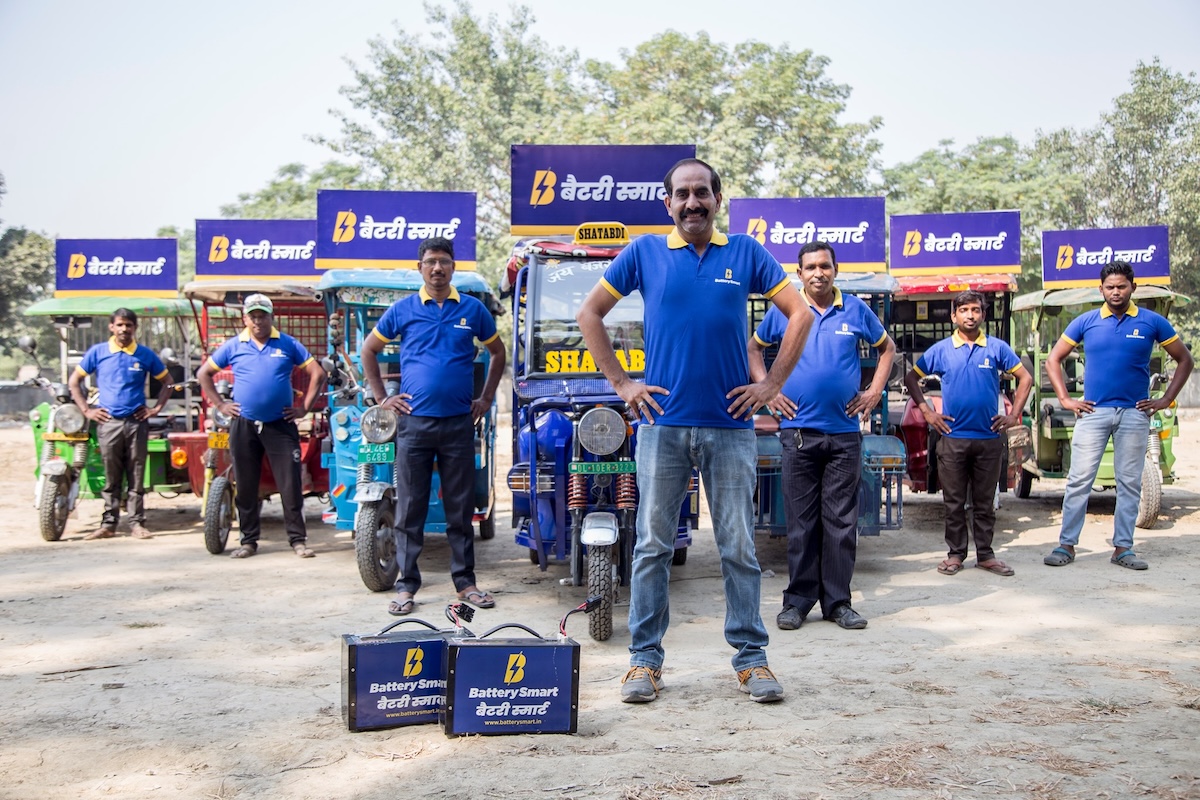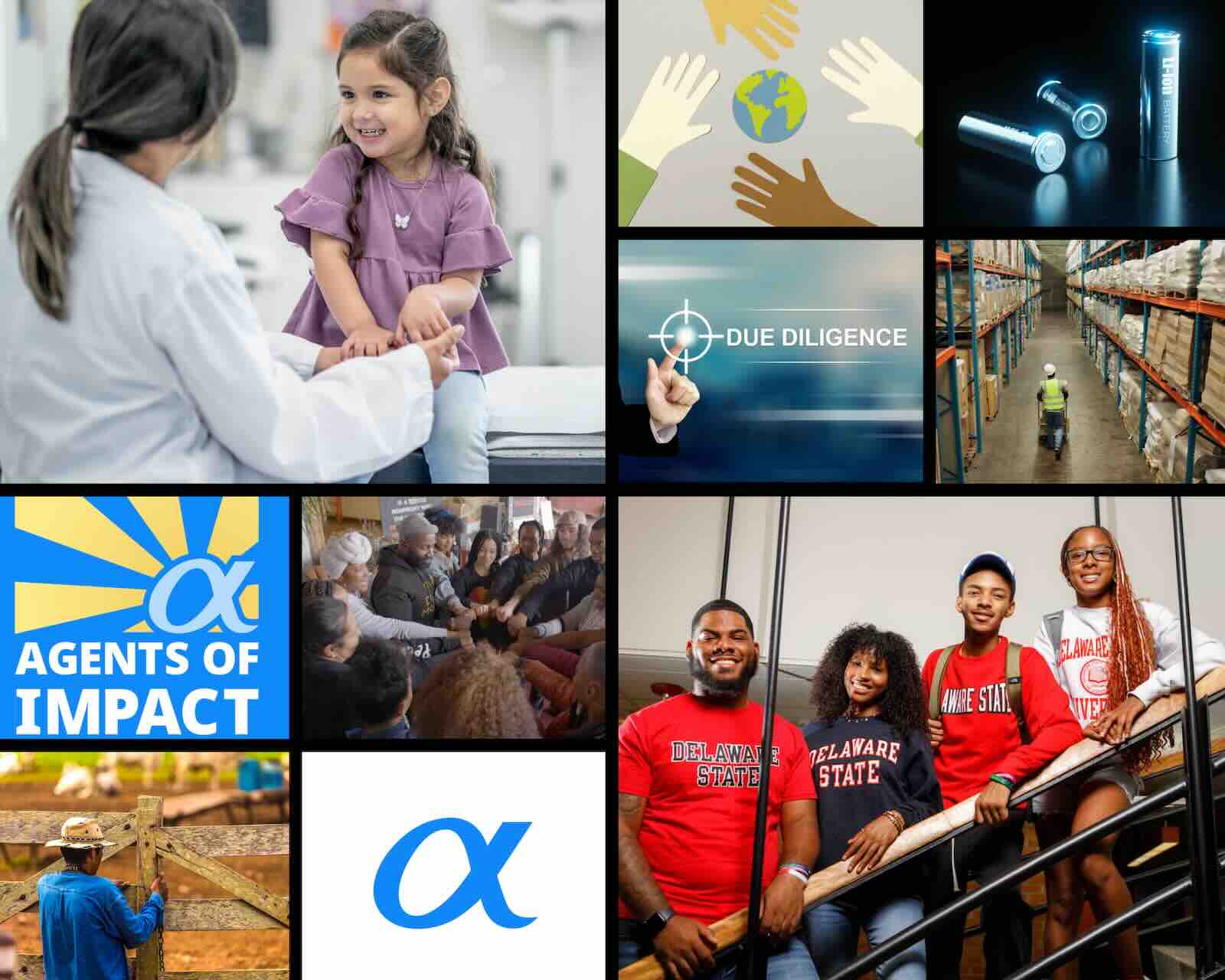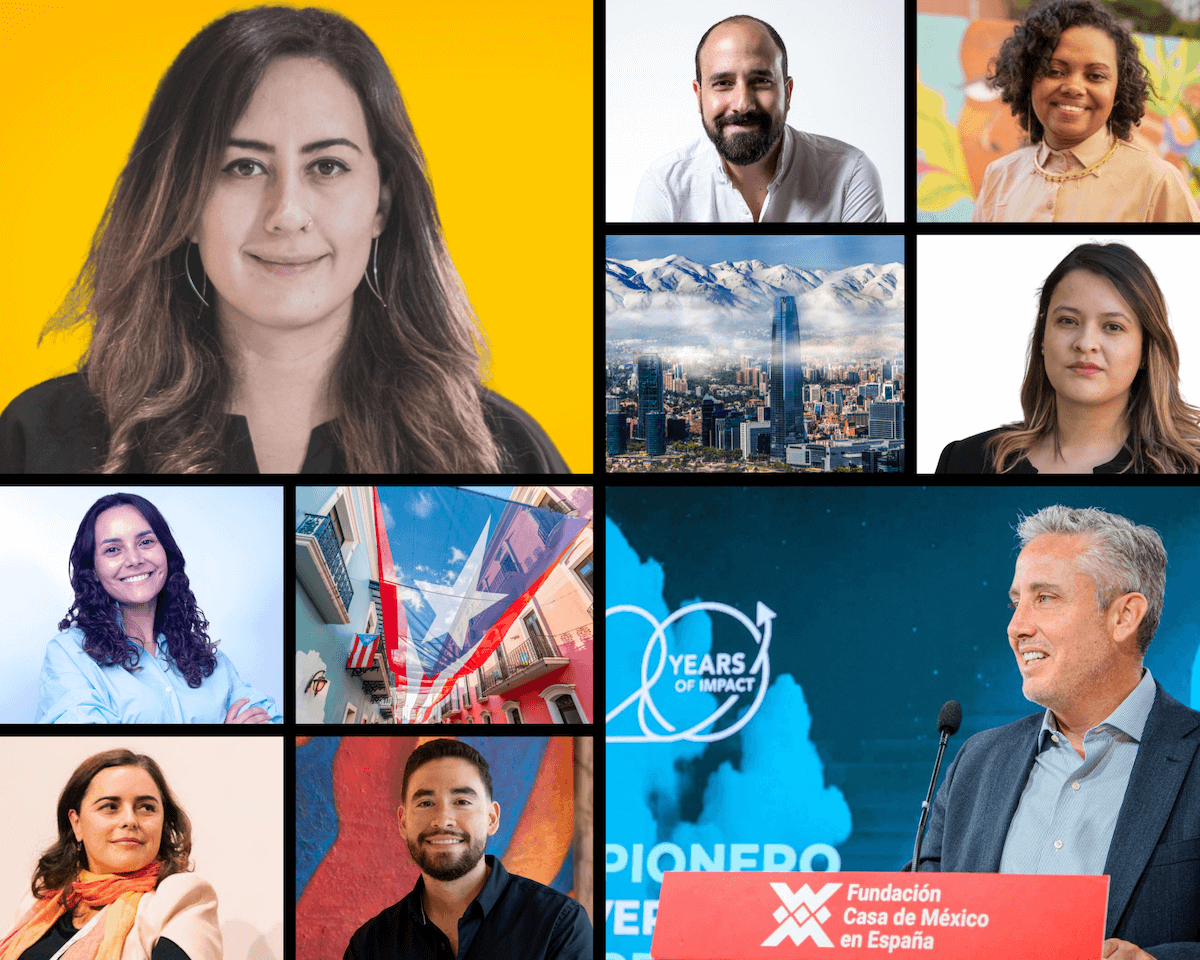If you missed any of our look-aheads to 2025, you can find them all here.
A new era requires new narratives. In dozens of profiles and podcasts, ImpactAlpha has shared the stories of Agents of Impact who are crafting those narratives.
They’re also investing to generate jobs and economic prosperity, ensuring the energy transition reaches all communities, lifting up Native communities, responding to the crisis in mental health and much more.
“I invite you all, if it’s not us, to really think about the opportunities where you are to lean into narrative change,” director Ava DuVernay told funders at this year’s Mission Investors Exchange conference. “Because they’re there and it’s powerful. Be brave.”
Here’s just a sample of the people and projects we profiled in 2024:
Ava DuVernay, Array
Changing the narrative in Hollywood and beyond
The shuttering of Jeff Skoll’s Participant in 2024 makes even more pressing the need for new models for social-change moviemaking. “We’re a narrative-change studio in a town that is in a time of flux,” director Ava DuVernay says of Array, the “social impact collective dedicated to narrative change” she created in 2011 to amplify voices of color and women in Hollywood. DuVernay’s latest film, “Origin,” is a powerful reflection on the persistence of hierarchy across history and cultures, told through the story of how Isabel Wilkerson wrote her 2020 book, “Caste.” The story of how DuVernay made the movie is equally powerful.
- Read David Bank’s Agent of Impact profile of Ava DuVernay.
Jahi Wise, Environmental Protection Agency
Architecting a green bank for the US
The $27 billion in the Greenhouse Gas Reduction Fund kicked off an inclusive green energy transition that promises to reach deep into long-neglected communities. Jahi Wise was instrumental in making that happen. Wise was an advisor to a newly elected President Joe Biden when ideas began to take shape for a national “green bank” to spur local lending for green energy retrofits, heat pumps, community solar and other green projects. The Inflation Reduction Act, passed two years ago, carved out $27 billion for such a “bank,” to be overseen by the Environmental Protection Agency.
- Read Amy Cortese’s Agent of Impact profile of Jahi Wise.
Damien Dwin, Lafayette Square
Investing in working-class people and places (podcast)
An investment strategy for the US working class? Watch this space in 2025. As a lender to the kind of middle-market companies that employ vast swaths of the country’s skilled workers, Lafayette Square discounts its interest rate for borrowers that demonstrate they understand the value of such employees. Lafayette Square offers such borrowers a package of “workforce solutions” to help low- and moderate-income workers save for retirement, access health benefits, reduce their families’ financial insecurity and increase their economic mobility. “Labor and geography are two critically overlooked areas in our current system,” founder Damien Dwin told ImpactAlpha.
- Listen to David Bank’s Agent of Impact podcast conversation with Damien Dwin.
Ines Schiller, Vyld
Reengineering the tampon – and the ethos of biotech
A lover of nature and the outdoors, Berlin-based Ines Schiller was frustrated by the lack of period products designed for both sustainability and health. Feminine products, and tampons specifically, represented an opportunity. “As a menstruator, I just wasn’t happy with the products out there,” she says. Enter the kelpon – a seaweed-based tampon designed to biodegrade anywhere, including in household compost. Schiller founded Vyld, which is developing the product using a combination of seaweed and cotton fibers. Schiller is aiming to produce a 100% seaweed product that is smoother and more absorptive.
- Read Jessica Pothering’s Agent of Impact profile of Ines Schiller.
Skya Ducheneaux, Akiptan
Lending to Native-led producers gives Akiptan an edge in regenerative agriculture (podcast)
Indigenous lenders and investors are demonstrating new ways of doing business, shaped by and tailored to Indigenous communities themselves. Akiptan, a Native community development financial institution on the Cheyenne River Sioux Reservation in Eagle Butte, SD, has loaned more than $27 million to businesses and producers in nearly 30 tribal communities.
“Native agriculture is regenerative by nature,” says Skya Ducheneaux, who grew up on a cattle ranch on the reservation and now leads Akiptan. “There is something born and ingrained in all of our producers that if you take care of the land, the land is going to take care of you.”
- Listen to David Bank’s Agent of Impact podcast conversation with Skya Ducheneaux.
Jay Koh, The Lightsmith Group
Financing climate adaptation and resilience
When Jay Koh cofounded The Lightsmith Group in 2016, few people were talking about the need to invest in solutions to help people adapt to a changing climate. Eight years later, “climate adaptation” is the topic du jour. The dark irony: the worse the climate catastrophe gets, the more valuable climate adaptation solutions become. What Koh calls the “unavoidable opportunity” is commanding new attention from development finance institutions, pension and insurance funds and impact investors. “We’re seeing increased amounts of investor interest in adaptation and climate resilience, because the reality, year-on-year-on-year, of climate impact is becoming greater,” Koh told ImpactAlpha from COP29 in Baku, Azerbaijan.
- Read Amy Cortese’s Agent of Impact profile of Jay Koh.
Alison Taylor, NYU Stern
Charting a realistic course for ethical business (podcast)
The era of cake-ism (as in having it and eating it, too) has come to an inglorious end.
“I think we’re in an era of sober, restrained consideration of tradeoffs – and anchoring on treating workers with dignity and respect,” NYU’s Alison Taylor argues on an Agents of Impact podcast. Taylor, a professor at the Stern School of Business, is the author of “Higher Ground: How Business Can Do the Right Thing in a Turbulent World,” which attempts to chart a more focused and realistic course for ethical business – and challenges many of the assumptions of responsible or sustainable investing.
- Listen to David Bank’s Agent of Impact podcast conversation with Alison Taylor.
Kafi Lindsay, ImpactPHL
Leading the next era of impact in Philadelphia
ImpactPHL, the Philadelphia-based nonprofit behind the annual Total Impact summit, has found its CEO in Kafi Lindsay. A lawyer turned banker turned community economic developer, Lindsay’s goal is “to create a powerful impact investing ecosystem in Philadelphia that can be modeled nationally,” she told ImpactAlpha. Lindsay is connecting with ImpactPHL’s stakeholders, mapping out strategies to further boost the impact investing ecosystem, and doing the planning to build out “ImpactPHL 2.0.” One of Lindsay’s key objectives: driving more impact capital into Philly’s creative economy. “We’re looking at how we can get more investors into the arts and culture space, and looking at that as an economic generator,” she says.
- Read Roodgally Senatus’ Agent of Impact profile of Kafi Lindsay.
Edgar Villanueva, Decolonizing Wealth Project
Championing Indigenous fashion and finance
Edgar Villanueva is a model – literally – for the principles of reparative finance. On a Soho rooftop at New York Fashion Week, the activist and author of Decolonizing Wealth sported a suit made of vegan cactus leather from Mexican retailer Sarelly Sarelly, along with a beaded pendant by Navajo designer Sean Snyder. The Celebrating Indigeneity in Fashion event, hosted by Villanueva and his nonprofit, the Decolonizing Wealth Project, celebrated Indigenous fashion designers including Jontay Kahm, Korina Emmerich, Kayla Lookinghorse, and Hud Oberly, and championed climate sustainability. “I see this as a narrative change opportunity,” Villanueva told ImpactAlpha, “but also a wealth building opportunity for Natives in this industry.”
- Read Amy Cortese’ Agent of Impact profile of Edgar Villanueva.
Shawn Lesser, The REAL
A new path for men’s mental health
Shawn Lesser was long a familiar sight in baseball caps branded “Big Path Capital,” the impact investment banking and advisory firm he founded with Michael Whelchel in 2007. These days, he sports caps emblazoned with “The REAL,” short for The REAL Mental Health Foundation, the Atlanta nonprofit he launched last year to use conversation and community to improve the mental health of men and their families. Returning to his impact investing roots, he’s rolling out a fund of funds he hopes can attract $200 million for emerging mental health funds and companies. “We are building the mental health ecosystem by applying the same approach that succeeded in impact investing,” Lesser said at The REAL Summit in New York.
- Read Roodgally Senatus’ Agent of Impact profile of Shawn Lesser.



